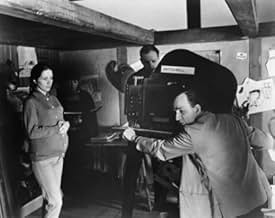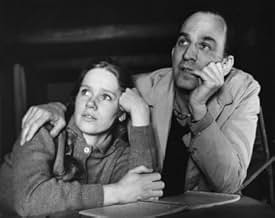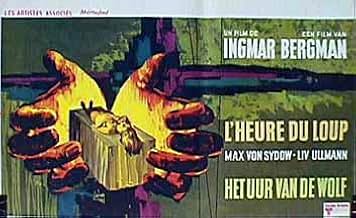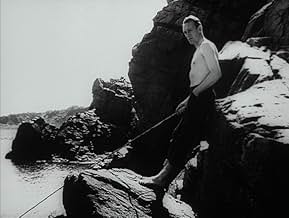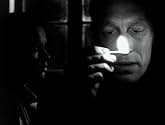VALUTAZIONE IMDb
7,5/10
23.800
LA TUA VALUTAZIONE
Durante una vacanza su una remota isola scandinava con la sua giovane moglie incinta, un artista ha un crollo emotivo mentre affronta i suoi desideri repressi.Durante una vacanza su una remota isola scandinava con la sua giovane moglie incinta, un artista ha un crollo emotivo mentre affronta i suoi desideri repressi.Durante una vacanza su una remota isola scandinava con la sua giovane moglie incinta, un artista ha un crollo emotivo mentre affronta i suoi desideri repressi.
- Regia
- Sceneggiatura
- Star
- Premi
- 2 vittorie totali
Agda Helin
- von Merken's Maid
- (non citato nei titoli originali)
Lenn Hjortzberg
- Kreisler
- (non citato nei titoli originali)
Mikael Rundquist
- Boy in Dream
- (non citato nei titoli originali)
Folke Sundquist
- Tamino
- (non citato nei titoli originali)
Recensioni in evidenza
It's not that scary or disturbing. From some of the comments here on IMDb I was expecting quite a tough film to sit through. It isn't exactly cheery, but I did crack the occasional smile at Bergman's homage to various Horror films. It is as beautifully lit and framed as Persona, and if you like Liv Ullman, and/or Max Von Sydow, you'll want to see this for their very good performances. It is sometimes "Lynch" like, sometimes "Fellini" like, but not nearly as disturbing as say Mulholland Drive. See it if you're a Bergman fan, or if you like movies with a surreal sense. I bought the DVD on Bergman's reputation (I've seen about 25 of his pictures, and loved, around 20 of them). I was not disappointed in the least.
10neil-313
This seems to be one that divides fans of the master, but I loved it. It's easy to see why people see this as being a bit of an odd-one-out in Bergman's output: it's very direct in it's depiction of disturbed states of mind, directly illustrating hallucinatory states rather than just hinting at them. Others have pointed to references to other films of the horror genre, which seem undeniable.
Not that you'd mistake this for a film by anyone but Bergman. It's rich in connections with other of his films and autobiographical references (such as the terrifying description of being locked in a cupboard as a child). It can be reasonably thought of as Bergman's 'horror film' but he takes on the genre very much on his own terms.
It's a film that lingers long in the mind, with many unforgettable scenes (including the amazing Magic Flute scene) aided by Sven Nykvist's wonderful chiaroscuro photography. The use of music is (as ever with Bergman, the most musical of directors) extremely intelligent: the scene with the boy is set apart from the rest as much by the music as the photography.
Given the quality of the cast, you'd expect superb performances. As ever, von Sydow and Ullmann are excellent, with equally good supporting performances.
At times I was reminded of Rilke's only novel, The Notebook of Malte Laurids Brigge. If you don't know this, I urge you to seek out a copy: there's a distinctly Bergmanesque atmosphere to the whole work, but there are specific images that seem to link to this film.
This is a film that repays repeated viewings. Despite it's extremely disturbing subject matter, to me it's not as emotionally draining as many of Bergman's other films (such as Shame or Winter Light), in spite of (or perhaps because of) the visual horrors on display. Still, I recommend it very highly.
Not that you'd mistake this for a film by anyone but Bergman. It's rich in connections with other of his films and autobiographical references (such as the terrifying description of being locked in a cupboard as a child). It can be reasonably thought of as Bergman's 'horror film' but he takes on the genre very much on his own terms.
It's a film that lingers long in the mind, with many unforgettable scenes (including the amazing Magic Flute scene) aided by Sven Nykvist's wonderful chiaroscuro photography. The use of music is (as ever with Bergman, the most musical of directors) extremely intelligent: the scene with the boy is set apart from the rest as much by the music as the photography.
Given the quality of the cast, you'd expect superb performances. As ever, von Sydow and Ullmann are excellent, with equally good supporting performances.
At times I was reminded of Rilke's only novel, The Notebook of Malte Laurids Brigge. If you don't know this, I urge you to seek out a copy: there's a distinctly Bergmanesque atmosphere to the whole work, but there are specific images that seem to link to this film.
This is a film that repays repeated viewings. Despite it's extremely disturbing subject matter, to me it's not as emotionally draining as many of Bergman's other films (such as Shame or Winter Light), in spite of (or perhaps because of) the visual horrors on display. Still, I recommend it very highly.
a man moves to a remote island with his wife. he cannot sleep at night and is tormented by inner demons. the film tracks this madness of his. excellent performances by max snydow and liv ullman. the cinematography is beautiful and precise. as is usual with bergman's films, it is not clear on first viewing what the movie is all about. why the man is tormented, is a mystery, at least to me.
a lot of even of the most loyal bergman fans claim that they came away from this one confused and irritated, and found it lacking in meaningful symbolism. i wonder if they watched the same movie i did?? this is just about one of the most intriguing, imaginative horror movies i've ever seen, and it is indispensable for those who enjoy the occasional dip into the proverbial pool of cinematic madness and mental derangement. i'm not in uncritical praise of everything bergman made, and some of his movies are admittedly a bit heavy handed and depressing, but i see this one as an example of what he could do when he decided to go all out. johann (max von sydow) and alma (liv ullmann)are husband and wife, and sydow's character is basically a tormented artist who has moved to the deceptively serene and quiet island with his wife to collect himself and try to escape his personal demons. to say the least, it doesn't exactly pan out that way. i believe the constant darkness and atmosphere of chaos and fear in the film is a metaphor for the human condition, because when you really reflect on it, we can never tell if the impressions we get and the ideas we have are projections of our imaginations or have some basis in reality, just as johann and his loyal wife cannot tell if these superficially amiable but suspiciously odd people are really there or are illusory creations of his mind. lindhorst, 'the birdman', is a particularly chilling character, and i would venture to say that the scene in which he puts on a puppet show for the couple and the rest of the socialites/demons is the key to the film. lindhorst creates a scene from mozart's "the magic flute", and recites (during a truly haunting close up), the dialogue from a scene crucial to the meaning of the symphony. one of the crucial characters, tamino (and anyone into mozart will understand what i'm talking about)collapses in the *palace of wisdom*, that is, a terrible place where he has discovered the tragic truth about human life and it's meaninglessness, and asks desperately "when will mine eyes the daylight see?" lindhorst is quick to recite the reply:"soon, soon fair youth..or never." he then goes on to talk about how mozart was terminally ill at the time of it's composition, and i would not be surprised if this entire scene was a metaphor for the artists' struggle with the fact of death and it's crushing finality:how can the creative individual, more sensitive to the issue of ultimate meaning as regards the human condition, be content or happy with anything when he knows that the world just might be and probably is what thomas carlyle called it, "an uncaring hall of doom"? how can we be sure of our meanings, when they could be wishful projections of our own minds, when the beliefs we have about ourselves and others cannot be purely objective or subjective? if this is the case, don't we necessarily live in a shadow house of illusions and absurdities? anyone with half a brain can see that there IS existential symbolism in this film. rich, unbearably tense, masterful horror and surrealism at it's finest. buy it.
Johan can't escape from traumas past, he's tormented, harrowed, provoked and harassed, his mind is playing tricks, it tortures, taunts, afflicts, leaves him confused, muddled, perplexed and aghast.
A surreal overflowing meltdown, full of symbolism, abstraction and confusion, as the artist Johan Borg struggles to cope with the visions and apparitions that haunt his disturbed being. Max von Sydow and Liv Ullman once again present us with characters from the imagination of Ingmar Bergman that exist in an alien world, or at least one most of us are quite unfamiliar with (thank goodness), in a piece of cinema, like so many others from the director, that need revisiting whenever you get the chance, if for no other reason than to see what you missed previously.
A surreal overflowing meltdown, full of symbolism, abstraction and confusion, as the artist Johan Borg struggles to cope with the visions and apparitions that haunt his disturbed being. Max von Sydow and Liv Ullman once again present us with characters from the imagination of Ingmar Bergman that exist in an alien world, or at least one most of us are quite unfamiliar with (thank goodness), in a piece of cinema, like so many others from the director, that need revisiting whenever you get the chance, if for no other reason than to see what you missed previously.
Lo sapevi?
- QuizBergman defines "The Hour of the Wolf" as "The time between midnight and dawn when most people die, when sleep is deepest, when nightmares are most palatable. It is the hour when the sleepless are pursued by their sharpest anxieties, when ghosts and demons hold sway. The hour of the wolf is also the hour when most children are born." According to "Films in Review" critic Henry Hart in the U.S. it's about 4 a.m. when the body's resistance is least.
- Versioni alternativeThere exists an earlier version of the film with an additional, meta-cinematic framing device. In the prologue (lasting about 7 minutes), Bergman is seen on the set directing his actors. The epilogue (lasting about 1 minute) shows us the set being torn down and the crew leaving. These sequences are the only differences to the commonly seen version. Bergman has stated in an interview that he cut off these sequences himself before the general release of the film, as he came to the conclusion that they were just "self-deception". Despite this, a Swedish 35 mm print of the original, longer version does exist, although it's not available on home video in any format.
- ConnessioniEdited into 365 days, also known as a Year (2019)
I più visti
Accedi per valutare e creare un elenco di titoli salvati per ottenere consigli personalizzati
- How long is Hour of the Wolf?Powered by Alexa
Dettagli
- Tempo di esecuzione1 ora 28 minuti
- Colore
- Mix di suoni
- Proporzioni
- 1.37 : 1
Contribuisci a questa pagina
Suggerisci una modifica o aggiungi i contenuti mancanti

Divario superiore
By what name was L'ora del lupo (1968) officially released in India in English?
Rispondi

